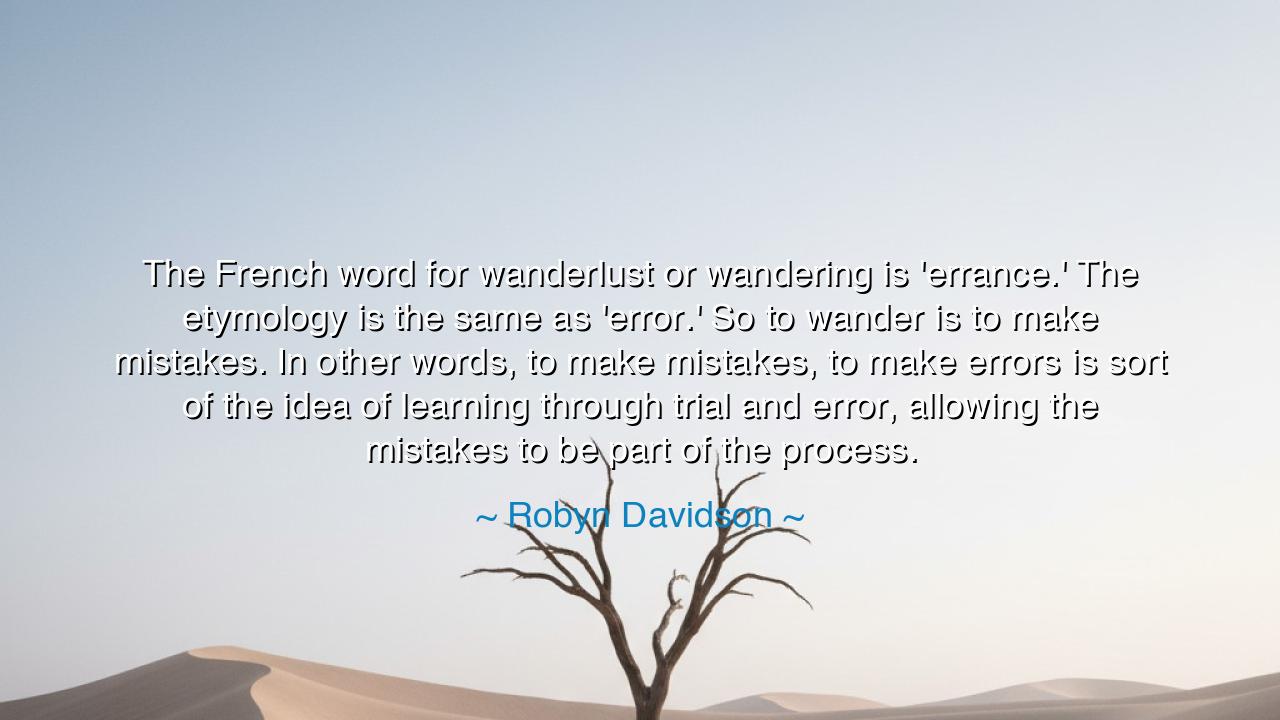
The French word for wanderlust or wandering is 'errance.' The
The French word for wanderlust or wandering is 'errance.' The etymology is the same as 'error.' So to wander is to make mistakes. In other words, to make mistakes, to make errors is sort of the idea of learning through trial and error, allowing the mistakes to be part of the process.






When Robyn Davidson reflected, “The French word for wanderlust or wandering is 'errance.' The etymology is the same as 'error.' So to wander is to make mistakes. In other words, to make mistakes, to make errors is sort of the idea of learning through trial and error, allowing the mistakes to be part of the process,” she spoke with the wisdom of one who has walked far—both across the earth and through the deserts of the soul. Her words carry the fragrance of dust and distance, of nights under starlit silence, of a journey not toward conquest but toward understanding. Davidson, famed for her solo trek across the Australian desert, knew that the road of wanderers and seekers is never straight. It is a path carved by missteps, detours, and failures that become, in time, the very stones upon which wisdom stands.
In the manner of the ancients, her teaching reminds us that to err is to evolve, and that those who fear mistakes fear life itself. The French word errance—born of the same root as error—reveals an ancient truth hidden in language: that the act of wandering and the act of making mistakes are intertwined, like two vines of the same tree. To wander is to stray from the known path; to err is to deviate from the perfect plan. Yet in both, there is movement, discovery, and the possibility of revelation. Perfection, by contrast, is motionless—a polished stone that gathers no moss, reflects no growth. Thus, Davidson’s insight is not merely linguistic—it is philosophical, a call to embrace the sacred art of imperfection.
Her words are the echo of every journeyer who ever sought truth beyond comfort. Consider the story of Christopher Columbus, who set sail westward in search of Asia and instead stumbled upon a new world. His voyage was an act of monumental errance—a mistake that reshaped history. Or think of the scientists of the Renaissance, who failed countless times before unlocking the mysteries of nature. Even the sages of old—the Stoics, the Buddhists, the prophets—learned not through certainty, but through wandering in confusion until clarity dawned like morning light. Every error, every lost turn, every wrong step along the journey is a teacher in disguise, and only those who are humble enough to listen to their mistakes will find the way forward.
Davidson’s reflection also speaks to the inner journey, the pilgrimage of the spirit. The human soul, too, must wander. It cannot grow within the tidy walls of certainty; it must stray into the wild places of doubt, failure, and contradiction. To wander is to trust life—to believe that even when one loses the path, the path is still there, waiting to be found anew. The ancients understood this as the principle of initiation: one must first be lost in order to be transformed. The desert, both literal and symbolic, strips away the illusions of control, leaving the traveler exposed to truth. In such wandering, errors become revelations; wrong turns become holy lessons; and the traveler, once afraid of uncertainty, learns to walk with courage into the unknown.
There is also humility in Davidson’s message. In a world obsessed with progress and perfection, she reminds us that to err is to be human, and that there is honor in imperfection. The master craftsman leaves a small flaw in his work so that the gods may know he is not trying to rival them. The wise teacher allows the student to fail, knowing that experience is the deepest form of education. The wanderer, too, does not despise her errors; she welcomes them as companions, for they teach her to see the world—and herself—more clearly. Davidson’s idea of “learning through trial and error” is not a method but a philosophy: a way of walking through life with openness, resilience, and forgiveness.
Her insight was born from her own errance—her 1,700-mile walk across the Australian outback with only camels for company. She lost her way, faced hunger and doubt, and was tested by both nature and herself. Yet it was precisely through those errors—those missteps and moments of despair—that she found her truth. The desert became her teacher, and her mistakes became her map. So too must every soul walk its own wilderness, guided not by certainty but by curiosity, courage, and faith in the process of discovery.
So let the lesson of Robyn Davidson be passed down to all who seek meaning in their journeys: do not fear to wander, and do not curse your mistakes. For every error conceals a seed of wisdom, and every detour may lead you closer to your true destination. To live rightly is not to walk perfectly, but to walk honestly—to keep moving, learning, and listening as the path unfolds. The one who wanders with love in their heart will never be truly lost. Embrace your errance, for it is not failure—it is the rhythm of becoming, the music of growth, the sacred dance between the human spirit and the mystery of life itself.






AAdministratorAdministrator
Welcome, honored guests. Please leave a comment, we will respond soon